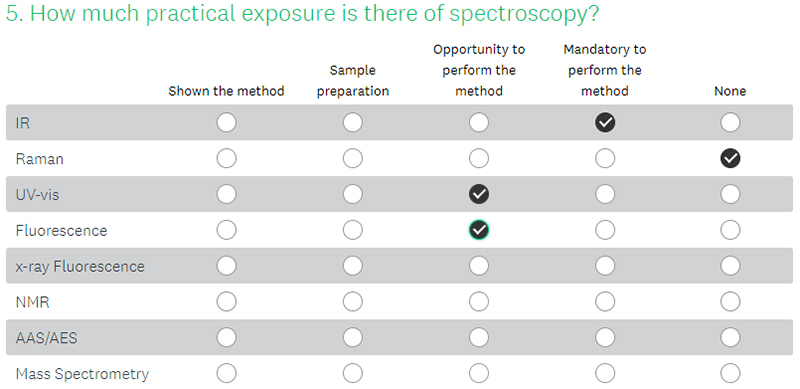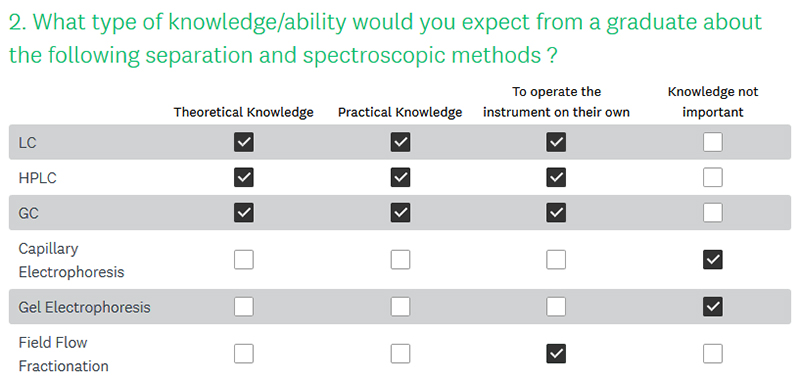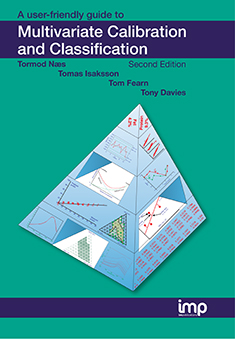Jennipher R.J. Dania,a Joachim Isaak Zahradnika and Antony N. Daviesb,c
aVan ‘t Hoff Institute for Molecular Sciences, University of Amsterdam, Postbus 94157, 1090 GD Amsterdam, the Netherlands
bExpert Capability Group – Measurement and Analytical Science, Akzo Nobel Chemicals b.V., Deventer, the Netherlands
cSERC, Sustainable Environment Research Centre, Faculty of Computing, Engineering and Science, University of South Wales, UK
Across all universities and industries it is often a favourite pastime of more senior members of staff to complain about the lack of knowledge and experience of their younger, maybe freshly recruited, colleagues. The obvious answer is “of course… they are younger and less experienced”; however, is there some truth behind the bluster? Are we currently turning out a generation of analytical chemists whose key skills no longer match the expectations of the working environment they are required to fit into? Two MSc students at the University of Amsterdam are currently looking into exactly this problem and we would like to recruit you and your opinions to see if this skills gap is fact or fiction. If you have read enough to persuade you to help… please go to the survey links below… if not please read on!
Pressures on educators
Teaching sciences at University level is an expensive business compared to other subject areas. Teaching subjects where laboratory work needs to be an integral and essential part of the higher education experience adds even more cost that the University must carry to deliver BSc or MSc graduates. Further, there are obvious significant space restrictions on the total number of science students you can recruit onto a course that must have access to lab bench space. Trying to draw more detailed comparisons of the financial pressures educating our essential analysts becomes quite complicated. These costs are covered in many different ways in different countries, and even separate states in individual countries. It is clear that, as analytical science advances, ever more expensive equipment should be being added to the curriculum—but at what level?
The Academics’ Survey specifically looks into whether the taught curriculum addresses such issues just in the lecture material, in lab classes or whether the students’ learning experience is aimed at giving them the skills to be trusted to operate the analytical equipment. An interesting aspect which the survey also looks into is whether the modules are optional or part of the core curriculum. In other words, can a student manage to become fully qualified at the same time as avoiding courses in areas that their future employers regard as a key skill area? Here again the educational methodology and the pressure on students varies greatly between countries. Some countries’ universities have strict timetables for the students to adhere to, with graduation usually achieved at a set date, known in advance of starting the course. Other educational practises involve students being expected to create their own educational experience by signing up to certain numbers of core or subsidiary modules every year. They build up a portfolio of credits based on the level at which they have achieved the correct grades in these selected modules and can even carry these credits across between universities if they wish to move establishments.
In some countries there is a strict assessment of the level and quality of the taught curriculum by some validation/accreditation body, such as a national chemical society. Other countries do not have this “standardisation” of the educational content and quality in place.
University finance officers trying to cope with ever increasing costs may well look hard at cutting back the courses and faculties which require proportionally higher levels of funding. Clearly, most countries cannot survive if their higher education establishments are forced to bend to such pressures and start only graduating poets and politicians. But the Key Performance Indicators for these financial decision makers are purely around keeping the educational establishment from making losses and do not extend to the general health of national economies. They will never get their bonuses by having enough of the latest mass spectrometers for students to gain the necessary practical experience employers expect, if there is no money left in the universities accounts to clean the toilets and put paper in the photocopiers. A university finance officer is not an envious role to take on.
Pressures on students
Differences between countries are definitely present when it comes to the student experience. In years past, some universities quite happily scheduled lecture courses into facilities which actually only had enough seating capacity for a fraction of students who should theoretically attend. I hope these experiences have passed, but this used to get quite a lot of media attention from protesting students and was probably more likely to occur at educational establishments which allowed the students to design their own courses.
This also applied to access to the precious lab space, which was quite often first-come-first-served. This either meant that some students simply could not get time in the lab in the particular year they wished to complete a module. Some universities had an “open lab” policy when students could come and go to complete the required experiments. However, he latter meant that the universities had to staff these extended opening hours with less highly educated and experienced people to make this affordable. In theory this should never occur where students are customers in a more restricted “planned economy” delivery model, where the burden of matching students to available resources is taken up by extremely stressed timetabling officers with access to some hopefully very intelligent room usage optimisation software!
We have mentioned the financial pressure on the Universities, but in some countries, attempts to remove the burden of financing higher education from general taxation have placed university fees directly on the shoulders of the students and their families. This has led to students leaving university with enormous levels of debt which they may never be able to pay off in their lifetimes. (In some countries debt is also inherited after death!) These financial pressures can cause students—whose school performance levels would indicate that they have the potential to develop into ideal analytical chemist material—to opt for less expensive educational choices when bench fees for the science/chemistry courses are added to the overall cost of their course selection. In extreme cases, these young people can even avoid university altogether, fearing the financial impact their education will have on the family as a whole. This is clearly a very serious problem for industrialised countries where the role played by analytical chemists and analytical spectroscopists becomes more and more central to the quality of all of our lives and to the strengths and competiveness of our economies.
The 2013–2017 UK Royal Society of Chemistry Analytical Division Strategy document includes a nice statement that
Analytical chemistry is not only a fascinating scientific discipline, but highly relevant and important in today’s world. We need highly talented and enthusiastic analytical scientists both now and in the future and so we will aim to inspire and train the analytical chemists of the future and contribute to the development of world-class analytical chemists.
However, how much influence do these good intentions have with the decision makers?
Pressures on employers
Although “Supply and Demand” is believed to also operate in the availability of highly skilled graduates, we clearly are not operating in an open market environment because the pressures on the supply chain are disconnected from the industrialists providing the demand. The Industrialists’ Survey aims at getting good statistics on the demand side of the equation. Essentially, we are looking to try to assess the mismatch between what our graduates have received in training and skills against what their employers would expect them to have received in a perfect (or even not-so-perfect) world. Employers would clearly want to have people they can integrate profitably into their teams in the shortest time possible with the least cost and the smallest amount of negative impact on the existing team productivity. The Industrialists' Survey attempts to put some details on this generality.
Employers now recruit globally. There are few restrictions on where new employees can be recruited from. This is especially true in highly technical roles, so Universities need to be aware that they are not only competing on a local or national level but at an international level to produce top quality output.
Possible benefits synergies through cost sharing
In Germany many years ago, there was an attempt to bring the Universities around the Ruhr area together to collaborate in delivering the best experience and training in Analytical Chemistry. The aim was to exploit the different areas of strength in the different universities. It failed, probably due to local rivalries and competition for students. Maybe we should look at this as a possible model for providing the best—and most appropriate training—for our new analysts and spectroscopists? However, we should not pre-judge the outcome of the two surveys, so if you have reached this far in the article and not yet spent a few minutes letting us have your opinions please do so now!
The surveys
To access the Academics’ Survey please use this link: https://nl.surveymonkey.com/r/8HVCMR5
To access the Industrialists’ Survey please use this link: https://www.surveymonkey.com/r/MYSKVMG
The surveys have adopted very simple, clear structures making them as painless as possible for those answering the questions to complete. Apart from fields where you can comment, there are fundamentally two types of multiple choice questions.
Selection questions
These have the format of a pick box against a short list of options where you need to select the nearest answer to your opinion (Figure 1).

Figure 1
Multi correct answer questions
In these types of survey questions, it is possible to select several answers at once for the different techniques (Figure 2).

Figure 2
So hopefully you will not find the survey too difficult to complete!
For those interested in previous attempts to get answers to these questions, it might be worth looking at what Julian Tyson at the University of Massachusetts Amherst reported in 1996 and again in 2006.1,2
References
- J. Tyson, “Education and training of analytical chemists: what is industry looking for in a B.S. chemist?”, Managing the Modern Laboratory, 1398 (1996). http://bit.ly/2HXsk0f
- J. Tyson and A.M. Fahey, “Education and training of BS analytical chemists for entry-level positions in industry: a survey”, The Chemical Educator 11(6), 445–450 (2006). doi: https://doi.org/10.1333/s00897061077a


